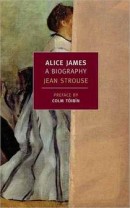 At Kirkus, Jessa Crispin interviews Jean Strouse about her biography of Alice James — sister of William and Henry — which has been reissued by the great NYRB Classics. At one point, Crispin asks Strouse if she approached her subject with a hidden agenda, given that Alice James has been “a symbol of the lost woman of the pre-feminist age, the hysteric, the spinster, the woman oppressed by the patriarchal era.” Strouse replies:
At Kirkus, Jessa Crispin interviews Jean Strouse about her biography of Alice James — sister of William and Henry — which has been reissued by the great NYRB Classics. At one point, Crispin asks Strouse if she approached her subject with a hidden agenda, given that Alice James has been “a symbol of the lost woman of the pre-feminist age, the hysteric, the spinster, the woman oppressed by the patriarchal era.” Strouse replies:
I specifically did not want to make Alice into a symbol or symptom of female oppression, victimhood, hysteria, etc. At times, during the process of “living with” and writing about her, I grew frustrated by the radical limitations of her life — even though of course I knew all along how the story was going to turn out. I couldn’t help, in the day-to-day evolution of her story, wanting it somehow to come out better, for her to have been happier, to have found more real pleasures and satisfactions.
What kept me honest was the admonition she sent to William as she was dying: “Pray, don’t think of me as a creature who might have been something else, had neurotic science been born.”
By “neurotic” she meant the science of nervous disorders—and she was right: Freud published his Studies on Hysteria in 1895, three years after Alice died. She knew her family and posterity would want to imagine who she “might have been.” Yet her prescient plea — “don’t make excuses for me; take me for what I am” — expressed her fierce sense of integrity, her hard-won philosophical acceptance and brave acknowledgment of her failures. Who she was turned out to be much more interesting than who she might have been.
And at Dead Critics, Lisa Levy writes at length about Strouse’s book, placing it in the context of the entire James family biography-industrial complex, including Leon Edel’s five-volume life of Henry and F.O. Matthiessen’s portrait of the clan:
Strouse is explicit in her book about building on Edel’s work as well as Matthiessen’s, specifically using Edel’s ideas about the bond between Henry and his sister. She writes, “Alice and Henry shared throughout their lives a deeper intellectual and spiritual kinship than either felt with any other member of the family. Within the family group the second son and only daughter were more isolated than any of the others.” While eldest brother William looked to their father and the outside world for approval, and middle children Wilky and Bob clung to each other, “what bound Alice and Henry together was a different kind of exclusion, and a profound mutual understanding. Henry had withdrawn early from the competitive masculine fray to a safe inner world, taking the part of the docile, easy, ‘good’ James child.” Henry had unknowingly occupied the “girl’s place,” which he and Alice then had to share, somewhat uneasily.

